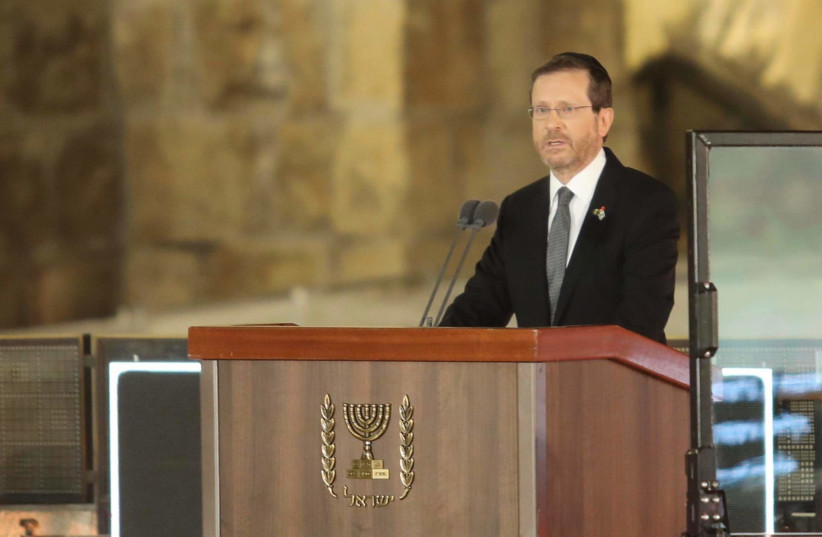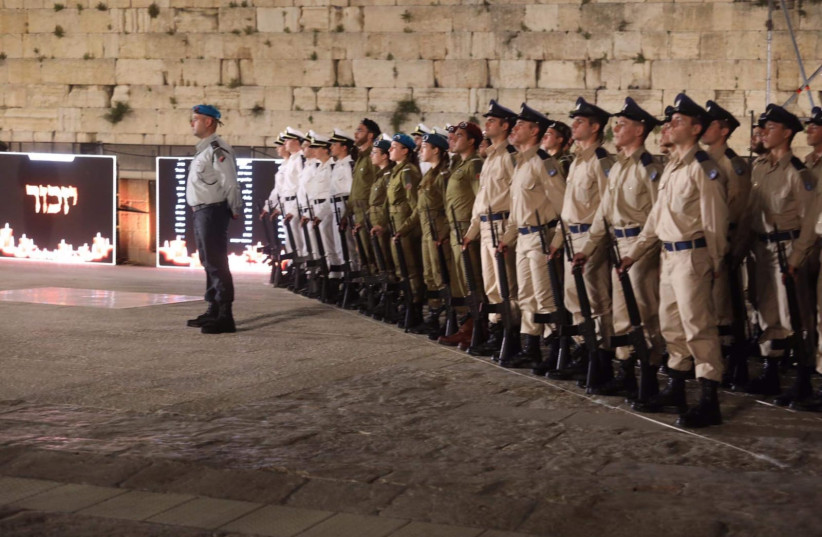Israelis owe their fallen soldiers and victims of terrorism a commitment not to let disagreements and political debates tear them apart, Prime Minister Naftali Bennett said on Tuesday at a ceremony marking the beginning of Remembrance Day.
“I cannot speak on behalf of the fallen, but I believe if they could, they would have told us: keep living together,” said Bennett. “Do not let disagreements tear you apart from within. If we allow anger and hatred to grip us, then our enemies will take advantage of it to harm us.”
His speech came just a few hours before Israelis stood in silence for one minute on Tuesday night, remembering the service members who died protecting the state and the victims of terrorism ahead of the country’s 74th Independence Day.
In total, 24,069 soldiers, police officers, prison wardens, Shin Bet (Israel Security Service) and Mossad agents were killed defending the pre-state Yishuv and Israel since 1860. That number also includes members of the pre-state militias and the Jewish Brigade, who served in the British army during World War II.
There were 3,199 civilians killed in hostilities since the establishment of the state, according to the National Insurance Institute.

In the past year, 56 IDF soldiers and security personnel died serving the State, and 84 IDF veterans who were injured during their service died. Since the end of March, 15 Israelis were killed in terror attacks.
“The siren that sliced through our lives a few minutes ago is the purest moment in the Israeli calendar,” President Isaac Herzog said on Tuesday night at the main Remembrance Day ceremony at the Western Wall. “A moment that plucks the cords of our souls. A moment of mighty, bitter grief. A moment that speaks to the essence of this week, the essence of the State of Israel itself: from the deepest grief to the miracle of independence and rebirth.”
Paying respects to the fallen who came from “all communities and sectors,” he said the country was “partners in pride and in pain. They served together, and their unity was an obvious fact. They were buried in the soil of this good land in the binding uniformity of its cemeteries, and their unity is an obvious fact. We remember them: their faces, their voices, their rolling laughter; the shells, the mines, the bullets that took their lives.
“Our sons and daughters, who fell in defense of our state, fought together and fell together. They did not ask, nor did anyone ask them, who was right-wing and who was left-wing. Who was religious. Who was secular. Who was Jewish and who was not Jewish. They fell as Israelis, defending Israel. In cemeteries, arguments fall silent.”
Embracing the bereaved families, IDF Chief of Staff Lt.-Gen. Aviv Kohavi said the pain felt by them was “unbearable, and the grief is oppressive... it is present and does not rest for a moment. It cruelly comes on Shabbat, holidays and birthdays.”
And while those who have fallen will not return, “thanks to them, many have returned,” he said. “Thanks to them, the lives of tens of thousands of citizens have been saved, and a large part of the security and achievements of the state is due to them. Go, take your destiny into your own hands. Abraham was commanded, and he moved his life to the Promised Land. The Promised Land has become a developed and high-achieving country, but it remains surrounded by threats and challenges.”
Such a reality needs its citizens to defend it, he added.
As in the past, Israel continues to face threats from a number of enemies, and therefore continues to carry out deterrent and aggressive operations that go beyond the country’s borders “to strike the enemy in the air, at sea and on land – all over the Middle East,” Kohavi said. “The way wars are raging in the world and in the region reminds us all of the need for a strong defensive force and the duty to prepare for everything. IDF soldiers and their commanders stand guard, fight and say, ‘Here I am,’ and I am very, very proud to command them.”
The IDF, Kohavi said, “enables all of us, as a nation, to exercise our right and duty to build a prosperous, worthy society that is full of life.”
Defense Minister Benny Gantz said that as a “bereaved commander,” the thoughts of those who fell under his command are with him every day.
“Every year during the siren, I try to remember them all. Try and fail. As the years went on, the list got longer, but the duration of the siren remained as it was,” he wrote on Twitter. “This day is very difficult for me. On a personal level. Before being the defense minister and chief of staff, I am human. The thoughts of all the people I have known over the years and who have fallen do not give me rest.”
Noting the over 24,000 IDF casualties, Gantz said that “our country is soaked in blood. The blood of sons and daughters who fought and defended the country. We have paid and still pay a great price for our independence.”
Speaking earlier at a commemoration event at the Yad Labanim memorial for fallen soldiers in Jerusalem, Bennett recalled his time as a soldier in Lebanon and the brothers-in-arms who fell there, naming several of them.
“We knew exactly who we were fighting for,” he said. “We were a small group of soldiers and officers. Everyone pretty much knew everyone. We knew which unit performed which operation. I, too, as a company commander in Maglan, was part of the same group of soldiers.”
“There, in the outposts in southern Lebanon, I fell in love with our wonderful people,” Bennett said. “We all, in our hearts, fell in love. It was impossible not to. We were together. Many of our friends stayed there. Young people, 19- or 20-year-olds, did not return. They will remain our brothers forever.

“On this day we all embrace the families who have lost the most precious of all. Out of the sanctity of this day, out of longing for those who are not with us, we swear to preserve this home, which was their home, the home they sacrificed their lives for.”
Knesset Speaker Mickey Levy, whose soldier brother was killed 32 years ago, said as the years go by, even though the memories fade, the longing only increases.
“For you, my brothers and sisters, to the bereaved family, a family I reluctantly joined 32 years ago, there is no need for a special day to remember,” he said. “Every day brings with it memories of our loved ones. When we eat a piece of cheesecake he loved, when we pass by the school she attended, when we see in the street a back of a person who reminds us of our loved ones, suddenly it hits us. A vague picture from other, happier days. A strong longing. A sense of a missed opportunity. A stab in the heart. A sigh. A tear.”
Remembrance Day began at 8 p.m. on Tuesday with a one-minute memorial siren throughout the country. Memorial ceremonies took place immediately afterward.
On Wednesday, a two-minute siren will sound at 11 a.m., followed by official state memorial services at 52 military cemeteries and at memorial sites.
Gil Hoffman contributed to this report
